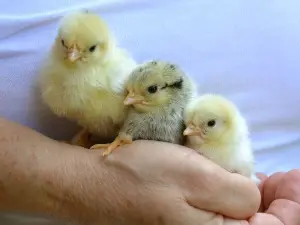
Baby chicks will not always be energetic and full of life, these animals may sometimes be sleepy. Baby chicks will be a balance of sleepy and energetic. But if your baby birds are not active at all then you should be concerned.
If your baby chicks are suddenly weak, lethargic, and not moving you’d be right to be concerned. This article explores why this happens.
Table of Contents
Baby chick is not moving:
Baby chicks may be pint-sized but this doesn’t mean that they will sit down and keep quiet all day long. These birds have some energy in them, well they should. Here are reasons why your baby chicken may not be moving:
Your chick is tired from the trip:
If you’ve just received a chick in the mail then the bird likely arrived very weak to the point where it can’t move. The bird is likely tired, dehydrated, and weak after the long trip.
This is a common occurrence and it can be remedied quite easily
What to do:
The first thing that you need to do is make sure that the bird is warm. A warm bird’s internal organs can work properly when at the correct temperature. The bird will be able to eat and drink on its own and gain some energy once it is warm enough.
The temperature of the border should be set to 95 degrees during the first week of the bird’s life.
The next thing you’d need to do is hydrate the bird. Giving the bird lukewarm water to hydrate it, or even lukewarm sugar water to both hydrate the bird and give it an energy boost, is recommended.
Avoid offering the bird cold water as this can be a shock to its system. If the bird can’t drink for itself then you can dip its beak into the water to get it to drink
Feeding the bird will also help get its energy up, you can feed young chick raw egg yolk.
Pasty butt:
Pasty butt is a condition that is actually quite common in new chicks who have been sent via mail.
Sending chicks by mail is perfectly safe but it can cause your chicks to become stressed because of the trip and because they were left in boxes that were often stored in overheated rooms.
Chicks brooded by hens will generally not suffer from pasty butt because their temperature is more controlled and because these birds don’t come under stress in their early days of life.
Past butt is a condition where the chick’s vent becomes clogged, or pasted up, with the bird’s dried-up stool. This stool cannot come out on its own and thus blocks the bird’s vent and sticks to the bird’s feathers as well
This plugging of the bird’s vent can keep waste products from being able to escape, the waste then stays in the bird’s body for extended periods of time.
Other signs of pasty butt in chicks, in addition to lethargy and the poop at the vent, include slow growth, not sleeping, a protruding vent, not eating or drinking, and not sleeping.
You’d need to quickly treat your bird of pasty butt as pasty butt can kill your bird. If you don’t treat this ailment, then the waste will keep building up in the bird’s digestive system, poisoning the bird and the bird can die.
What to do:
Check to see whether the bird does an infant have pasty butt. Hold the bird looking away from you and look at the bird’s vent.
A bird with pasty butt will have dark brown poop stuck at its vent, the vent of a healthy bird, without pasty butt, will be clean, and pink and have no debris or waste on it.
If you realize that the bird has a pasty vent then you’d need to remove the hardened poop.
Start off by wearing gloves and running the bird’s butt under some warm water to loosen the poop.
Wipe the bird’s poop using a cotton bud while the water is running at its butt. Keep wiping but don’t pull the poop out as this can pull the bird’s insides out or pull its feathers out.
Once the poop is gone, you can hair dry the bird to dry it off and add some vaseline, (not olive oil or any other vegetable oil) to the butt if the area looks red and irritated.
Coccidiosis:
If you’ve had your chicks for a little while, and the bird has come into contact with another bird’s droppings then the chick may have coccidiosis.
Coccidiosis is a common disease caused by a parasitic organism that attaches itself to the bird’s intestinal lining causing the bird to lose the ability to absorb nutrients.
Young chicks, usually birds under six months of age, are more susceptible to contracting this disease because their bodies have not had the chance to develop natural immunity.
Other signs of a chick with this disease, apart from lethargy and not moving, include a pale comb or skin, ruffled feathers, diarrhea, blood at the bird’s vent, and decreased growth.
What to do:
You can use Amprolium to treat your chick of this disease, the treatment needs to be given for 7 days even if the bird shows improvement.
This medication can also be used as a preventative measure against the disease.
If you enjoyed this article then you may also be interested in other chicken related articles. Here are some articles that you may be interested in: Mold In Chicken Coop, Chicken Has A Broken Leg At The Hip, Chicken Missing Its Top Beak, Chicken Beak Peeling, Growth On Chicken Beak,

